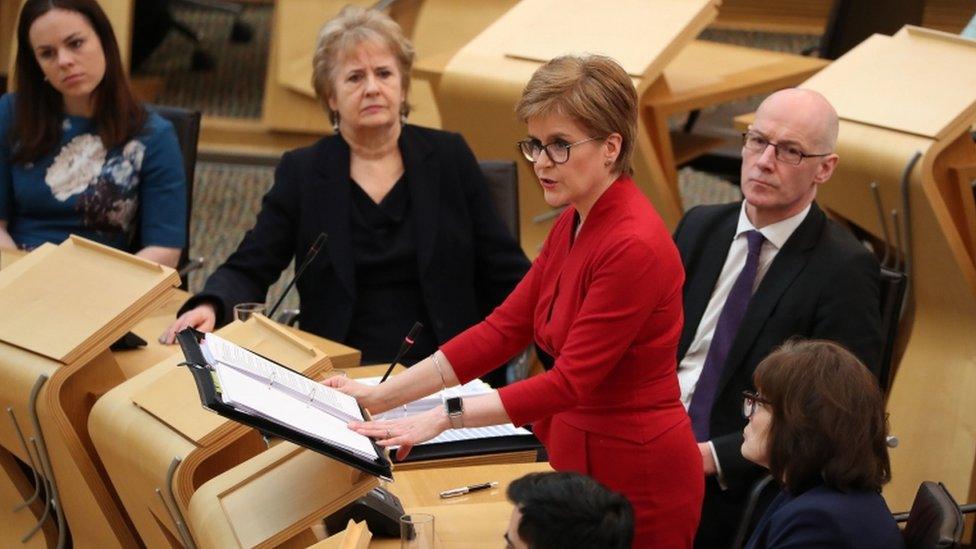MSPs bring gravity and focus to coronavirus debate
- Published

Holyrood's leaders had serious, measured exchanges about the coronavirus threat
Nothing concentrates the mind quite like malady and mortality. So it proved when opposition leaders arose to question Nicola Sturgeon at Holyrood.
They eschewed partisan discourse and focused instead on the potential threat from coronavirus. The first minister responded in like fashion, attempting to cajole and reassure in the same breath.
Ms Sturgeon explained her thinking. She had to be frank with the public, explaining the potential risk. Without going so far that it horrified the citizenry unnecessarily.
In truth, she managed this blended task with notable expertise. For example, she advised on hygiene while disarmingly conceding that a politician prating about hand-washing risked sounding patronising.
Plaudits too to Jackson Carlaw of the Conservatives and Richard Leonard for Labour.
Both succeeded in posing detailed practical questions about readiness - without at any point stretching the consensus which had palpably emerged, to the effect that this threat was far too grave to indulge in political argument.
And so they asked about the availability of beds and of staff. They asked about hospital discharge, about social care, about NHS laundries.
In each case, they received a detailed reply. There was no rancour. No rhetoric. No accusations or flailing gestures. Plainly, the Scottish government strategy of briefing the opposition at all points, involving them in the discussions, has worked.
More generally, it was a job well done. Ms Sturgeon was demonstrably held to account. She knows that, if there is any slippage in performance by the Scottish government or the NHS, then she can expect close and precise scrutiny.
But all went about their business with gravity and focus. A fearful populace would expect nothing less.
It couldn't last, of course. However, I am reluctant to chide Alison Johnstone of the Greens. She was careful to preface her main remarks with praise for the consensual nature of the attempts to contain coronavirus.
From that, she moved on to condemn the first minister for what she saw as neglect in tackling the issue of flaring at Mossmorran in Fife.
Flares of fury
Ms Johnstone was demonstrably angry on behalf of residents near the plant. But then she went a step further, suggesting with a touch of vitriol that the first minister was too thirled to the fossil fuel industry to act.
Today, the Greens will vote to back the Scottish budget, having secured concessions in a deal. Perhaps Ms Johnstone was intent on demonstrating her own party's continuing distance from the SNP, despite this agreement.
Whatever, Ms Sturgeon was less than happy. She voiced her displeasure at continued flaring - but noted that the Mossmorran situation was already subject to regulatory and possibly criminal investigations.
It would be entirely wrong, she argued, for ministers to intervene in such circumstances, given the hazard of prejudice. Ms Johnstone resumed her seat, discontented.
Alister Jack has turned a bridge into a tunnel
Earlier at Holyrood, the Scottish Secretary Alister Jack gave evidence to MSPs, for the first time. It was, mostly, an assured performance. Committee members from rival parties tried to pin him down on the issue of trade with the EU, post Brexit.
But he deployed three tactics in response. Ineffable politeness, charm itself. Political boldness, dismissing concerns with confidence and counter evidence.
And, if pushed, strategic deafness. Blaming tinnitus, he shuffled a couple of questions on to his eager officials.
Then it came. The moment. Mr Jack was asked about the prime minister's plan for a bridge from Scotland to Northern Ireland.
According to the secretary of state, a better idea was a tunnel, linking his own south-western constituency to NI. Cheaper, safer - without the hazard of having to close in stormy weather.
The planned bridge, he declared, was a "euphemism" for a tunnel. Love it.